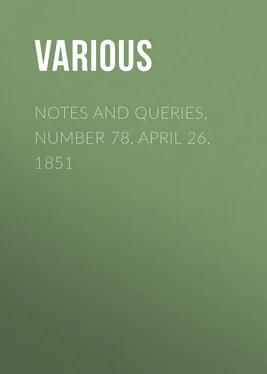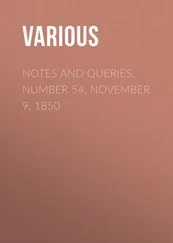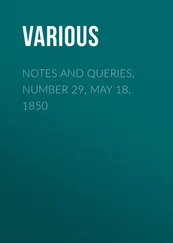Various - Notes and Queries, Number 78, April 26, 1851
Здесь есть возможность читать онлайн «Various - Notes and Queries, Number 78, April 26, 1851» — ознакомительный отрывок электронной книги совершенно бесплатно, а после прочтения отрывка купить полную версию. В некоторых случаях можно слушать аудио, скачать через торрент в формате fb2 и присутствует краткое содержание. Жанр: foreign_antique, periodic, foreign_edu, на английском языке. Описание произведения, (предисловие) а так же отзывы посетителей доступны на портале библиотеки ЛибКат.
- Название:Notes and Queries, Number 78, April 26, 1851
- Автор:
- Жанр:
- Год:неизвестен
- ISBN:нет данных
- Рейтинг книги:4 / 5. Голосов: 1
-
Избранное:Добавить в избранное
- Отзывы:
-
Ваша оценка:
- 80
- 1
- 2
- 3
- 4
- 5
Notes and Queries, Number 78, April 26, 1851: краткое содержание, описание и аннотация
Предлагаем к чтению аннотацию, описание, краткое содержание или предисловие (зависит от того, что написал сам автор книги «Notes and Queries, Number 78, April 26, 1851»). Если вы не нашли необходимую информацию о книге — напишите в комментариях, мы постараемся отыскать её.
Notes and Queries, Number 78, April 26, 1851 — читать онлайн ознакомительный отрывок
Ниже представлен текст книги, разбитый по страницам. Система сохранения места последней прочитанной страницы, позволяет с удобством читать онлайн бесплатно книгу «Notes and Queries, Number 78, April 26, 1851», без необходимости каждый раз заново искать на чём Вы остановились. Поставьте закладку, и сможете в любой момент перейти на страницу, на которой закончили чтение.
Интервал:
Закладка:
Stanzas 54. "Mother-age."; 93. "Mother-age, for mine I know not."
This mother-age is a great difficulty. At first I took it for the past of history , but now understand by it the past of his own life , at least its earliest and brightest period—that age which had been as a mother, the only mother he ever knew.
Stanza 70. "Youthful joys." The bright hopes of his youth. (?)
Stanza 75. "Blinder motions," Less rational, less well-guided emotions.
Stanza 91. "The distance." The distant future, the "good time coming."
There are some lines in In Memoriam (I have not the book at hand, but any reader thereof will instantly recollect them), which indicate Tennyson's acquaintance with and appreciation of Jeremy Taylor, who thus expresses the thoughts of the "wild fellow in Petronius," suggested by the sight of a floating corpse.
"That peradventure this man's wife, in some part of the Continent, safe and warm, looks next month for the good man's return or, it may be, his son knows nothing of the tempest: or his father thinks of that affectionate kiss which is still warm upon the good old man's cheek ever since he took a kind farewell; and he weeps with joy to think how blessed he shall be when his beloved boy returns into the circle of his father's arms."— Holy Dying.
Compare with "Sure never moon to evening," &c., in the same poem, and I think the same place:
"Nec nox ulla diem, neque noctem aurora secuta est,
Quæ non audierit mistos vagitibus ægris
Ploratus mortis comites, et funeris atri."
FOLK LORE
Sacramental Wine (Vol. iii., p. 179.).—From a note by Mr. Albert Way, on the use of sacramental wine, one would be led to infer that it was recommended on account of some superstitious belief in its superior excellency from having been used in religious worship; but I would suggest that the same reasons which recommend Teynt wine, the kind generally used for the Sacrament, are those which have established for it a reputation in cases of sickness: these are its rich red colour, and sweet and agreeable flavour.
Weakness is popularly supposed to be caused by a thinness and want of blood; if wine be recommended for this, there is a deeply rooted prejudice in favour of red wine because the blood is red, and upon no better principle than that which prescribes the yellow bark of the barberry for the yellow state of jaundice; the nettle, for the nettle-rash; and the navel-wort ( Cotyledon umbilicus ), for weakness about the umbilical region. The truth is, that rustic practice is much influenced by the doctrine of similitudes, the principle of " similia similibus curantur " having been more extensively recognised in the olden time than since the days of Hahnemann.
The sweetness of Teynt wine would recommend it for children, to whom a stronger wine is generally distasteful; but Port is generally prescribed as a tonic for adults.
It may further be remarked, that the recommendation to give Sacramental wine might arise from the fact, that, as in some parishes more wine is provided than is required, the remainder is put by to be given to the poor who may require it at the hands of the clergyman.
In sending these remarks, I am led to request that your correspondents would make Notes upon such old wives' remedies as are employed upon the principles I have mentioned.
James Buckman.Cirencester, April 12.
Cure of Disease by means of Sheep. —A child in my parish has been for some time afflicted with disease of some of the respiratory organs. The mother was recommended to have it carried through a flock of sheep as they were let out of the fold in the morning. The time was considered to be of importance.
ב.L– Rectory, Somerset.
ANCIENT INEDITED BALLADS, NO. IV
I next transcribe the following lines from the same MS. as my last. It is another epitaph on the Mr. Browne that I mentioned in No. II. It contains a curious illustration of a passage in Shakspeare, which has been often debated in the pages of "Notes and Queries," and so deserves preservation.
"Vpon the death of that right worthye man, Mr. Browne, late of Caius and Gonville Colledge disceased. Epicedion."—( Harl. MSS. , No. 367. fol. 155.)
"If vowes or teares from heartes or eyes,
Could pearce the unpenitrable skyes,
Then might he live, that now heere lyes.
But teares are tonguelesse, vowes are vaine,
T' recall what fate calls; els how faine
What death hath seis'd, wold I regaine.
But sure th' immortal one belaves
This wished soule in 's blissfull waves:
Ill comes too oft, when no man craves.
Rest, therefore, vrne, rest quietlye,
And when my fates shall call on me,
So may I rest, as I wish the.
I need hardly point out the striking similarity between the expression in Shakspeare—
"and the delighted spirit
To bathe in fiery floods,"—
and the third stanza of this poem.
Kenneth R. H. Mackenzie.POETICAL COINCIDENCES, ETC
In the Jealous Lovers of Thomas Randolph, the following passage occurs, which may possibly have suggested to Lord Byron the fearful curse he has put into the mouth of Eve, in "the grand and tremendous drama of Cain ." 1 1 Sir Walter Scott.
"May perpetual jealousie
Wait on their beds, and poison their embraces
With just suspitions; may their children be
Deform'd, and fright the mother at the birth:
May they live long and wretched; all men's hate,
And yet have misery enough for pity:
May they be long a-dying—of diseases
Painful and loathsome," &c.
That exquisite stanza in the Third Canto of Childe Harold , "Even as a broken mirror," &c., has been often admired. In Carew's poem, The Spark , I find the following lines, which contain similar image:
"And as a looking-glass, from the aspect,
Whilst it is whole, doth but one face reflect,
But being crack'd, or broken, there are shown
Many half faces, which at first were one;
So Love," &c.
To the coincidences which have been already pointed out regarding that exquisite line in the Bride of Abydos :
"The mind, the music breathing from her face,"
the following from Carew may perhaps be added:
"The harmony of colours, features, grace,
Resulting airs (the magic of a face)
Of musical sweet tunes, all which combin'd,
To crown one sovereign beauty, lie confined
To this dark vault."— Epitaph on the Lady S.
All will recollect the wonderful description of the shipwreck in Don Juan ; and more particularly the incidents so graphically related in stanzas 52 and 53 of the Second Canto: to a part of which, the following passage fro Lee's Œdipus bears some resemblance:
"Methought I heard a voice,
Now roaring like the ocean, when the winds
Fight with the waves; now in a still small tone
Your dying accents fell, as wrecking ships,
After the dreadful yell, sink murm'ring down,
And bubble up a noise."
I have now before me a print of John, the first Lord Byron, engraved from a painting in the collection of Lord Delaware; in which he is pourtrayed in armour, with a truncheon in the left hand, and the right arm bare to above the elbow. Can this have suggested to Lord Byron the idea of describing "Alp the renegade" as fighting with "the white arm bare," in the Siege of Corinth ?
Читать дальшеИнтервал:
Закладка:
Похожие книги на «Notes and Queries, Number 78, April 26, 1851»
Представляем Вашему вниманию похожие книги на «Notes and Queries, Number 78, April 26, 1851» списком для выбора. Мы отобрали схожую по названию и смыслу литературу в надежде предоставить читателям больше вариантов отыскать новые, интересные, ещё непрочитанные произведения.
Обсуждение, отзывы о книге «Notes and Queries, Number 78, April 26, 1851» и просто собственные мнения читателей. Оставьте ваши комментарии, напишите, что Вы думаете о произведении, его смысле или главных героях. Укажите что конкретно понравилось, а что нет, и почему Вы так считаете.












